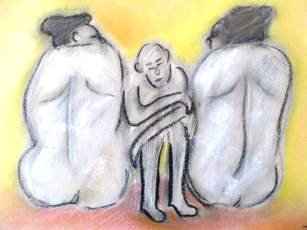Goodbye Hardbacks?
There's an interesting article in The New York Times, which has been referred to on a few blogs, resparking the old debate about the future of the hardback. Apparently, in the US, an increasing number of 'literary' novels are going straight into softback. This of course has been the norm at a few European publishing houses for a while, and one can see the sense in it (cheaper, more sales etc).
Many new writers, like me, would be happy to go straight into softback, given that people are more likely to spend the cash on it - thereby increasing the chances of staying on the radar. Having to struggle to get good hardback sales has been a debut novelist's nightmare; low figures can often mean that the work never comes out in softback.
I've read comments from authors who say they couldn't bear the thought of not first seeing their work in hardback; they say it truly represents everything they've worked towards - they need to grasp it, knock it, smell it, put the ribbon through the middle. That's all very well when they sell easily and the publisher, agent and writer rings up the sales from the hardbook AND the softback. That is not how many newcomers see it. The hardback represents a battle.
It's also true that readers get frustrated; they want to go out and buy the book they've heard about in the press and by word of mouth only to find the affordable version is not yet available. By the time the cheaper copy comes out they've forgotten about it, already enticed by other books that have appeared straight away in softback. I have many book loving friends who only ever buy softbacks.











































3 comments:
I do agree largely with your point of view, but you are (inevitably) looking at this from the writer’s perspective. Never forget in the book trade there are plenty of people other than the authors who are depending on profitable book sales for their living. (I speak as someone who is about to open a bookshop http://mostly-books.blogspot.com/ – it really focuses the mind!)
My initial investigations into what to sell/what makes money etc suggests that hardbacks cost about the same to produce as softbacks (surprising), but retail much higher – and make a greater percentage for the bookseller.
In a retail sector with (frankly) derisory profit margins, this is a big incentive to try to shift a few hardbacks. Persuading people for that it is worth the money to get their mitts on a new book and not to wait for it to come out in paperback is all part of the book trade.
Then you get a second bite of the launch cherry when it comes out in paperback. Publishers don’t make money on all their authors and need to squeeze what they cam out of their big sellers to help fund the launch of new authors – hardbacks help. Look how many people crowd into book signings for the chance of a signed first edition.
Which leads me onto – don’t forget collectors out there (I have a few highly prized first editions). No-one ever collects paperbacks. Then there are libraries. They account for a large part of the print run for hardbacks and the books have a longer shelf life, bringing you, the author, lovely agent-commission-free public lending rights for longer. Nicki, mostlybooks
Hi Nicki.
Thanks for your post. It's nice to get another perspective, because it's true that we do see things from the view of the writer (as you say that's inevitable). It's exciting to hear that individuals can still be keen to open their own bookshop. I have often thought of that here in France - an English bookshop to target a niche market. Good luck with your plans. I've put a link to your site on mine.
No one pays full retail for a hardcover book unless he or she is from another planet. On a lot of levels there is a price war going on. Even in my local bookstore, new books are priced at 10% off. Barnes & Noble prices can drop to 30-percent off for "club" members. Throw in the Internet pricing with the subcategory of inexpensive "used" books available at a click, and the intrinsic worth of hardcovers collapses.
But you knew that, right?
Post a Comment